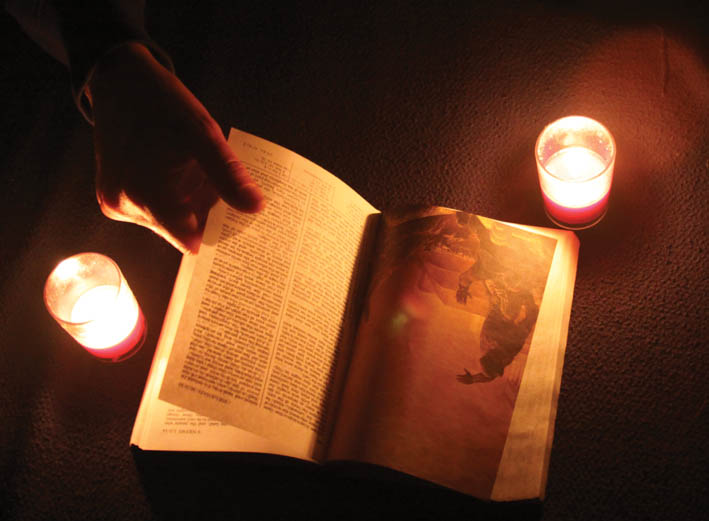“Hey, where are your horns?” a voice calls out to junior Matthew “Matt” Starnes upon hearing that Starnes is a Mormon. But Starnes just smiles good-naturedly and shakes his head at the ridiculous misconception. This was not the first time Starnes had heard this, and it most likely will not be the last. According to Starnes, who has been Mormon all of his life, telling others of his religion does not always go over well.
“I’ve had random people ask me if I have horns or how many wives I’m going to have—people that I’ve never talked to before. I don’t even know where that stuff comes from,” Starnes said. “There’s a lot people that don’t know what Mormonism is about and I think that’s why there are so many misconceptions.”
In this, Starnes is not alone. A 2012 study conducted by the Pew Research Center revealed that 46 percent of Mormons say there is a lot of discrimination against them in the United States today.
The reason why so little is known about the Mormon faith most likely stems from the fact that only about 2 percent of the U.S. citizens are Mormon, according to the 2006 Church Almanac. The Mormon religion was also created fewer than 200 years ago. According to Dr. Jan Shipps, professor emeritus of religious studies at IUPUI who specializes in the Mormon religion, Joseph Smith founded the Mormon Church in 1820 as a restoration of what he believed was the true church on earth.
Mormons, who are synonymously called Latter Day Saints (LDS), follow both a translated version of the Bible and the Book of Mormon. They do not drink alcohol, coffee or tea or use tobacco or illegal drugs. Dressing modestly and remaining chaste until marriage are also important parts of living in the Mormon faith.
“When you look at the Mormon religion you can see a certain distinction from really any other religion,” Shipps said. “On one hand they are considered Christians because they believe in Jesus Christ as their Savior; however, on the other hand they are a Judeo-Christian religion, and therefore they are technically just as Jewish as they are Christian.”
(Visit mormon.org to learn about Mormon doctrine, and its 13 Articles of Faith.)
Under the Religious Spotlight
In recent years, Mormonism has been thrust into the spotlight of American attention, more often than not for negative reasons. According to Shipps, one of the major misconceptions about members of the LDS faith is that they practice polygamy. While this was true when the Mormon faith was first being developed, the Mormon Church no longer promotes the practice. Those who do still practice polygamy are called fundamental Latter Day Saints (FLDS), a branch that has splintered off from the LDS Church today.

In 2008 the FLDS Church made headlines when the Texas Child Protective Services removed 416 children from the FLDS YFZ Ranch, a 1,700-acre community in Texas where polygamy was widely practiced. Leader Warren Jeffs was convicted of sexual abuse in August 2011. Because many do not understand the distinction between the FLDS and the LDS, the whole Mormon Church took a hard blow with that incident.
(Click here to see a recent LA Times article regarding charges against Warren Jeffs.)
Since then, the Mormon faith has also garnered attention from the Broadway musical “The Book of Mormon,” and from Republican presidential frontrunner Mitt Romney and former candidate Jon Huntsman, who are both Mormons.
According to Randall Roper, the bishop of the Church of Jesus Christ of Latter Day Saints in Carmel, all of the attention on Mormonism, whether it is positive or negative, can be turned into a learning experience for others.
“What (polygamists) are portraying is not a part of the LDS faith and it’s unfortunate. But it also can be something that can be positive because if people bring it up, it gives us opportunities to share what our beliefs really are,” Roper said.
Roper, who works full-time as a genetics professor at IUPUI and has practiced Mormonism his whole life, was called to be a bishop about a year ago.
“Before I was called to be the bishop, I worked with the youth. Because we have a lay ministry, meaning that everybody in the church has their normal job and then also a function in the church, one Sunday you can be teaching young kids and the next Sunday you can be called to be the bishop,” Roper said. “Being called to do something occurs through inspiration from God and leaders that are over us who call particular individuals.”
Changing Misconceptions
Roper, like Starnes, also said he believes that a lot of the misconceptions about Mormons may come from people not knowing a lot about them. According to the same Pew Research Center study on Mormons in America, 63 percent of Mormons surveyed say that they believe the American people know little or nothing about Mormonism. Mormon and senior Kenneth Griffey said he has heard outlandish misconceptions about Mormons, including that they burn Christmas trees or have magic underwear. Griffey said his religion can be a point of harassment by his peers as well.
“One time some kids were goofing off in class and the teacher was trying to talk and I was like, ‘Hey, be quiet’ to those kids, and one goes, ‘Oh just shut up, you’re Mormon. You don’t know what you’re talking about.’ Like thanks for reminding me what my religion is?” Griffey said.

Both Griffey and Starnes say they have dealt with others being ignorant or intolerant toward them for all of their life and try to not let it bother them anymore.
“I’ve kind of just grown up used to it. People bash on me all the time, but I don’t really mind now. Even my friends, but it’s not so bad because you know they’re just joking. When it’s strangers… I just don’t really get that,” Starnes said. “But I’ve kind of had to learn to live with it.”
However, despite the Pew Research Center’s findings that Mormons feel misunderstood, discriminated against and unaccepted by other Americans, a majority of Mormons also say that they feel that acceptance of Mormonism in the United States is rising. According to Roper, he personally has never had to deal with people directly accusing him of erroneous beliefs or discriminating against him or his family.
“I really haven’t dealt with (people having misconceptions) a lot. I find that most people respect me for being LDS. They respect my beliefs and they will actually make sure I’m comfortable with what’s going on,” Roper said.
As the Church continues to grow and expand, with upwards of 14 million members worldwide, many false impressions associated with the LDS faith will likely fade as well, according to Shipps.
“Because people don’t know a lot about Mormon faith, and I have found that (Mormons) often tend to prefer to socialize inside of their culture, misconstrued ideas have formed around the Church,” Shipps said. “The more people learn about the religion, though, the better it will be.”
Local Growth
A signal that the Mormon Church is growing, not only worldwide but within Indiana as well, is the plan that was revealed last year to build the first Mormon temple in Indiana, on the corner of 116th Street and Springmill Road in Carmel.
(Click here to see updates on the construction of the Mormon temple in Carmel.)
“We think it will take about three years to build, after a groundbreaking sometime soon, and we’re really looking forward to it,” Roper said. “Right now we travel to Louisville to go to the temple, which is a two-and-a-half hour drive, and we go four to five times a year to do work there. Once we have a temple here, we will be able to go much more often.”

The difference between a Mormon temple and a Mormon church is actually quite substantial. According to Roper, anyone is allowed to attend worship services in a Mormon church. However, to attend the temple one must acquire an official recommendation from a church leader by answering religious questions and demonstrating one’s worthiness to enter the temple.
“In the temple we perform sacred ordinances, some of which have to do with bringing families to be bound together eternally. We believe that the family unit can be together forever,” Roper said.
The Mormon temples can also be contributing factors to the degree of mystery shrouding the faith because of their restricted access to anyone outside of the Mormon faith. However, Roper said that everyone is invited to the temple as well as the church, as long as they are willing to follow God’s commandments within the Mormon religion.
Despite the misconceptions and harassment that Starnes is forced to deal with on nearly a daily basis, he said he remains open to teaching others about his religion so they may understand it better. The next time someone asks Starnes about his horns, and there will certainly be a next time, Starnes said he will let it roll off his shoulders and try to find humor in light of the situation, just like he has a hundred times before. And it’s not just from students. In middle school Starnes had a teacher who declared that she was anti-Mormon and that her pastor had taught her growing up that Mormons were evil. For both Starnes and Griffey, though, proclamations from others like this are far from unusual.
“I don’t even think that it’s that people don’t like us so much as they don’t know enough about us to like us,” Griffey said.
Roper, who said that he has frequently worked with the youth in order to help them understand situations with discrimination at school or among their peers, echoes Griffey’s beliefs.
“Most people rub shoulders with members of the LDS church everyday, and they don’t realize it. Find someone who’s Mormon and talk to him or her. Just sit down and have a chat with them and you’ll find out that they aren’t that much different than yourself,” Roper said. “Don’t shun us just because we’re a different religion.”































![AI in films like "The Brutalist" is convenient, but shouldn’t take priority [opinion]](https://hilite.org/wp-content/uploads/2025/02/catherine-cover-1200x471.jpg)













































![Review: “The Immortal Soul Salvage Yard:” A criminally underrated poetry collection [MUSE]](https://hilite.org/wp-content/uploads/2025/03/71cju6TvqmL._AC_UF10001000_QL80_.jpg)
![Review: "Dog Man" is Unapologetically Chaotic [MUSE]](https://hilite.org/wp-content/uploads/2025/03/dogman-1200x700.jpg)
![Review: "Ne Zha 2": The WeChat family reunion I didn’t know I needed [MUSE]](https://hilite.org/wp-content/uploads/2025/03/unnamed-4.png)
![Review in Print: Maripaz Villar brings a delightfully unique style to the world of WEBTOON [MUSE]](https://hilite.org/wp-content/uploads/2023/12/maripazcover-1200x960.jpg)
![Review: “The Sword of Kaigen” is a masterpiece [MUSE]](https://hilite.org/wp-content/uploads/2023/11/Screenshot-2023-11-26-201051.png)
![Review: Gateron Oil Kings, great linear switches, okay price [MUSE]](https://hilite.org/wp-content/uploads/2023/11/Screenshot-2023-11-26-200553.png)
![Review: “A Haunting in Venice” is a significant improvement from other Agatha Christie adaptations [MUSE]](https://hilite.org/wp-content/uploads/2023/11/e7ee2938a6d422669771bce6d8088521.jpg)
![Review: A Thanksgiving story from elementary school, still just as interesting [MUSE]](https://hilite.org/wp-content/uploads/2023/11/Screenshot-2023-11-26-195514-987x1200.png)
![Review: "When I Fly Towards You", cute, uplifting youth drama [MUSE]](https://hilite.org/wp-content/uploads/2023/09/When-I-Fly-Towards-You-Chinese-drama.png)
![Postcards from Muse: Hawaii Travel Diary [MUSE]](https://hilite.org/wp-content/uploads/2023/09/My-project-1-1200x1200.jpg)
![Review: "Ladybug & Cat Noir: The Movie," departure from original show [MUSE]](https://hilite.org/wp-content/uploads/2023/09/Ladybug__Cat_Noir_-_The_Movie_poster.jpg)
![Review in Print: "Hidden Love" is the cute, uplifting drama everyone needs [MUSE]](https://hilite.org/wp-content/uploads/2023/09/hiddenlovecover-e1693597208225-1030x1200.png)
![Review in Print: "Heartstopper" is the heartwarming queer romance we all need [MUSE]](https://hilite.org/wp-content/uploads/2023/08/museheartstoppercover-1200x654.png)




Bear Irringatti • Mar 22, 2014 at 10:25 pm
I completely agree with everything the author so perfectly wrote. Also, Mormons don’t have horns? Pretty sure I read that in the King James version of the Gospel of John or something.
Don kincheloe • Aug 31, 2012 at 4:48 pm
The King James Bible is the Bible we use, just like many other Christians. We don’t use some other translation.
Pet peeve: people who TELL me what I believe instead of ASKING me what I believe. 98% of the time they’re wrong. Go figure!
Amelia • Feb 23, 2012 at 5:47 pm
I completely agree! People are not properly informed of what we believe.